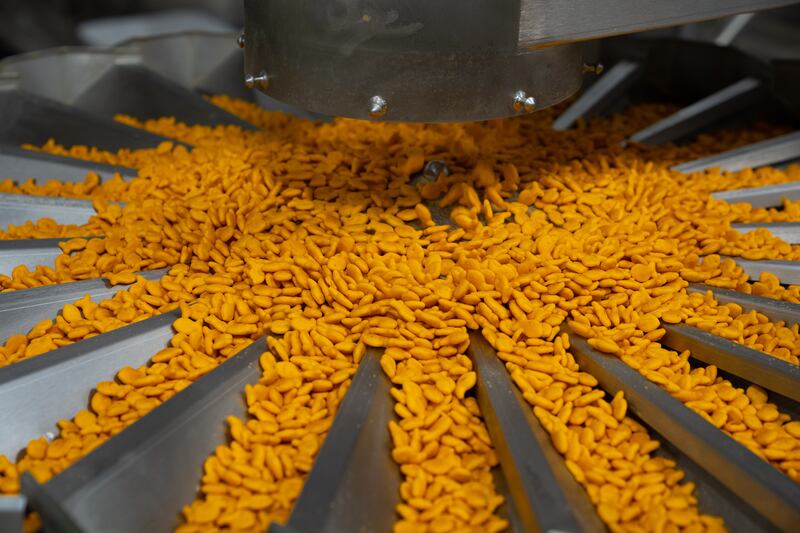This story appears in the October issue of Utah Business. Subscribe.
Utah’s 29 counties each offer businesses and employees something different. Named the best state in the nation two years in a row, it’s Utah’s varied counties that provide opportunities for all. In this series, I’ll be laying out the business case for each of them. Let’s visit Cache.

A Q&A with Chris Foley, EVP of The Campbell Soup Company and president of Campbell’s Snacks Division; and AJ Heiner, the Richmond bakery plant manager.
SBWT: The bakery in Richmond has been producing Pepperidge Farm products for 50 years now. What originally drew Pepperidge Farm and Campbell’s to Utah?
CF: Pepperidge Farm, as it was growing at a very fast rate, was growing across the country. This location was chosen to really fuel that growth in the West. … Across cookies and crackers and Goldfish, this location has really been the primary one for Pepperidge Farm in the West.
SBWT: The Utah Governor’s Office of Economic Opportunity awarded Pepperidge Farm a post-performance tax reduction. How has it been working with state and county governments, and how has that influenced the expansion of Campbell’s business in Utah?
AH: We received a rural economic development tax incentive for partnering with the state post-project, which has been great. As we formed and established relationships with local and state officials, they’ve been fantastic to partner with. We’ve had quite a bit of an interaction with the local officials. That’s where our employees live, so we look to partner with the communities, whether it’s through service or day-to-day interactions.
SBWT: Can you tell me about any specific initiatives or ways that Campbell’s strives to support the Richmond and Cache County area?
AH: Just earlier this year, Campbell’s donated $20,000 to the Cache Community Food Pantry. It’s an example of the investment of the organization in where we operate and where our team members live. From a plant perspective, we’ll have our team members volunteer at The Park Bench in Richmond, and we’ll go down to the food bank and help volunteer there as well. Campbell’s has a fantastic program where we actually do some matching with employees, time or dollar-for-dollar matching. We also have different giving campaigns, and so we leverage those opportunities to give back to the community.
SBWT: How does Pepperidge Farm partner with local farmers and support local agriculture?
AH: We have some of the farmers come to the plant and do a tour. Flour is our No. 1 ingredient, and so we use a lot of wheat. Every year, we have the farmers come in and see how the flour is used to make cookies and goldfish, which is a fantastic partnership. … We’ll have people come into the thrift store and ask, “How do we sell our wheat to the mill?” It’s interesting [to see] how integrated it is in the community.
SBWT: What do you see in the future for Campbell’s partnership with Cache County?
CF: This facility is one of our best facilities in the entire country and across the entire company. This is why we’ve made such a big investment — one of the biggest investments we’ve actually ever made — at Campbell’s in the new Goldfish line. … We have a great partnership with the state of Utah, with terrific plant leaders like AJ, and we continue to invest behind that.

A Q&A with David Zook, CEO of Cache County.
SBWT: What are Cache County’s strengths?
DZ: Cache County’s strengths lie in its growing economy, young population, strong agricultural foundation and skilled workforce. The county’s emphasis on education through Utah State University and Bridgerland Technical College creates a well-prepared talent pool, while its agricultural roots create a strong work ethic. Cache County’s location also offers access to urban centers like Salt Lake City without the drawbacks of high living costs or congestion, making it ideal for both businesses and residents.
SBWT: How does the newly expanded Pepperidge Farm bakery support agriculture in the county?
DZ: The expansion of the Pepperidge Farm bakery supports local agriculture by creating demand for ingredients sourced from nearby farms, fostering partnerships within the county’s agricultural community. This connection enhances the local supply chain, benefiting both the agricultural sector and the factory’s production capacity. This symbiotic relationship strengthens the economy by keeping resources and profits within the county.
SBWT: Cache County’s unemployment rate is currently at 2.9 percent. What are the challenges and opportunities related to having a low unemployment rate?
DZ: One challenge of a low unemployment rate is that it may create a labor shortage, limiting the ability of businesses to expand or maintain operations. On the other hand, it presents an opportunity for wage growth and workforce development, as employers may invest more in training and upskilling local workers. This can also encourage innovation in business practices and the adoption of new technologies to improve efficiency.
SBWT: What types of businesses does Cache County want to entice to set up shop? How is the county supporting business retention efforts?
DZ: Cache County seeks to attract businesses that align with its existing strengths in agriculture, manufacturing, technology and education. Companies that focus on innovation and value-added agricultural products are particularly encouraged. The county is also interested in supporting the growth of small businesses and startups that can leverage our resources and talent pool.
Cache County has partnered with our neighboring counties … and local businesses to [provide] resources such as training programs and networking opportunities. We work closely with our local chambers of commerce and educational institutions to ensure businesses receive the support they need to stay competitive and grow.

Cache County quick facts:
Named for caches of furs stored by Rocky Mountain Fur Company trappers
Population: 140,173 as of 2022
Produces more dairy products than any other county in Utah
The Ellen Eccles Theatre hosts over 100 shows annually and is 100 years old.
Main economic activity areas include manufacturing, trade, education, agriculture and dairying.
Home to the second lowest temperature ever recorded in the lower 48 states: -69.3 in 1985
The Pepperidge Farm bakery currently employs 400 people.
The bakery expansion will add 86 new jobs.
The new production line will produce 1,500 Goldfish every second.

